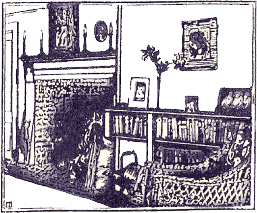Posted by Sue Hallgarth on May 9, 2013
Built in 1901-1903 for Sarah Fisk Bacon Harris (1821-1912), the Harris house was new when Willa Cather met Edith Lewis in Harris’ parlor. The Sarah Harris that Lewis talks about is Sarah B. Harris, who lived with her mother, Sarah Fisk Bacon Harris, in the new house. This house replaced the earlier Harris home, an Italianate house at the same location: 1630 K Street in Lincoln, Nebraska.
In the introduction to her memoir, Willa Cather Living (New York: Alfred A. Knopf, 1953) Edith Lewis describes their meeting:
I first met Willa Cather in the summer of 1903. I had come home, having just graduated from an Eastern college [Smith], to Lincoln, Nebraska, where I was born and brought up. Willa Cather was spending that summer with her family in Red Cloud. On her way back to her teaching job in Pittsbugh, she stopped off for a few days in Lincoln to visit Sarah Harris, the editor of the Lincoln Courier, and it was at Miss Harris’ house that I first met her.
Sarah Harris was a very unusual woman for that time and place. Lincoln was probably not more provincial than most college towns of the period: the older women, as I recall it, found innocent recreation in duplicate whist and Browning clubs; the younger ones were lost, mind and soul, in college fraternity activities. In that rather prosaic social atmosphere, where the chief aim in thought was to think correctly, Sarah Harris stood out as a challenging and, to Lincoln people certainly, a most unconventional figure. She came of one of Lincoln’s “best” families. Her brothers, I believe, had high positions in Chicago with the Burlington Railroad, and they may have helped her to finance the Lincoln Courier—a weekly—which she not only founded, but of which she was the publisher, editor, business manager, and I think even, when necessity arose, the type-setter.
She was a generous impulsive, downright, and very emotional person. I remember her bursting into tears once when she was having an argument on politics with my father; it was the first time I had ever seen a grown person cry. She was completely free in her thinking; all her ideas were her own, and she expressed them with an impetuous honesty very refreshing in that rather inhibited society. In the Courier she carried on fierce political campaigns, for which she wrote the editorials; she published society items; and she ran a brilliant column of dramatic criticism signed Willa Cather.
From the time they first began to appear, I was enthralled by these articles on actors and the stage. I was very much interested in writing; and this seemed to have all the qualities I most admired; I felt it to be daring, provocative, original, imaginative; and it gave me a sense of being out in the world, among exciting and momentous things. I used to ask people who Willa Cather was, but never got any very satisfactory answers. In January, 1903, a short story of hers, A Death in the Desert, was published in Scribner’s Magazine, and I read it with fervent admiration. I suppose I must have communicated my enthusiasm to Sarah Harris, for when Willa Cather stopped in Lincoln that summer to visit her, she invited me to come to her house one afternoon and meet her.
How deeply one takes impressions when one is young! In that first meeting I think I felt, without at all formulating it, all that was really essential in what I afterward came to know of Willa Cather.
When the maid showed me into the parlour, Willa Cather and Sarah Harris were having a spirited discussion about something,–I have no idea what—and after I was introduced, they paid no attention to me, but continued their conversation. Willa Cather, a rather slim figure, in a grey and white striped cotton dress, was sitting very upright in a straight-backed chair. She had curling chestnut-brown hair, done high on her head, a fair skin; but the feature one noticed particularly was her eyes. They were dark blue eyes, with dark lashes; and I know no way of describing them, except to say that they were the eyes of genius. I have never met any very gifted person who did not have extraordinary eyes. Many people’s eyes, I have noticed, are half opaque; they conceal, as much as they express, their owner’s personality, and thought, feeling, struggle through them like light through a clouded sky. But Willa Cather’s eyes were like a direct communication of her spirit. The whole of herself was in her look, in that transparently clear, level, unshrinking gaze that seemed to know everything there was to be known about both herself and you.
I had been silent, a fascinated spectator, while Willa Cather and Sarah Harris carried on their duel of words; but when I got up to go, Willa Cather accompanied me to the door, and there she stood and talked with me for fifteen or twenty minutes, giving me her whole attention. She talked to me as if we were fellow-students, both pursuing the same vocation. (Sarah Harris had published one or two of my college themes in the Courier; she loved to encourage young people, and besides, she had to fill up her space every week, and had almost no money to pay for contributions; but her Burlington brothers could always get free transportation for her, and she would reward me with passes to Omaha and to Colorado.)

 Whale Cove Inn Living Room
Whale Cove Inn Living Room